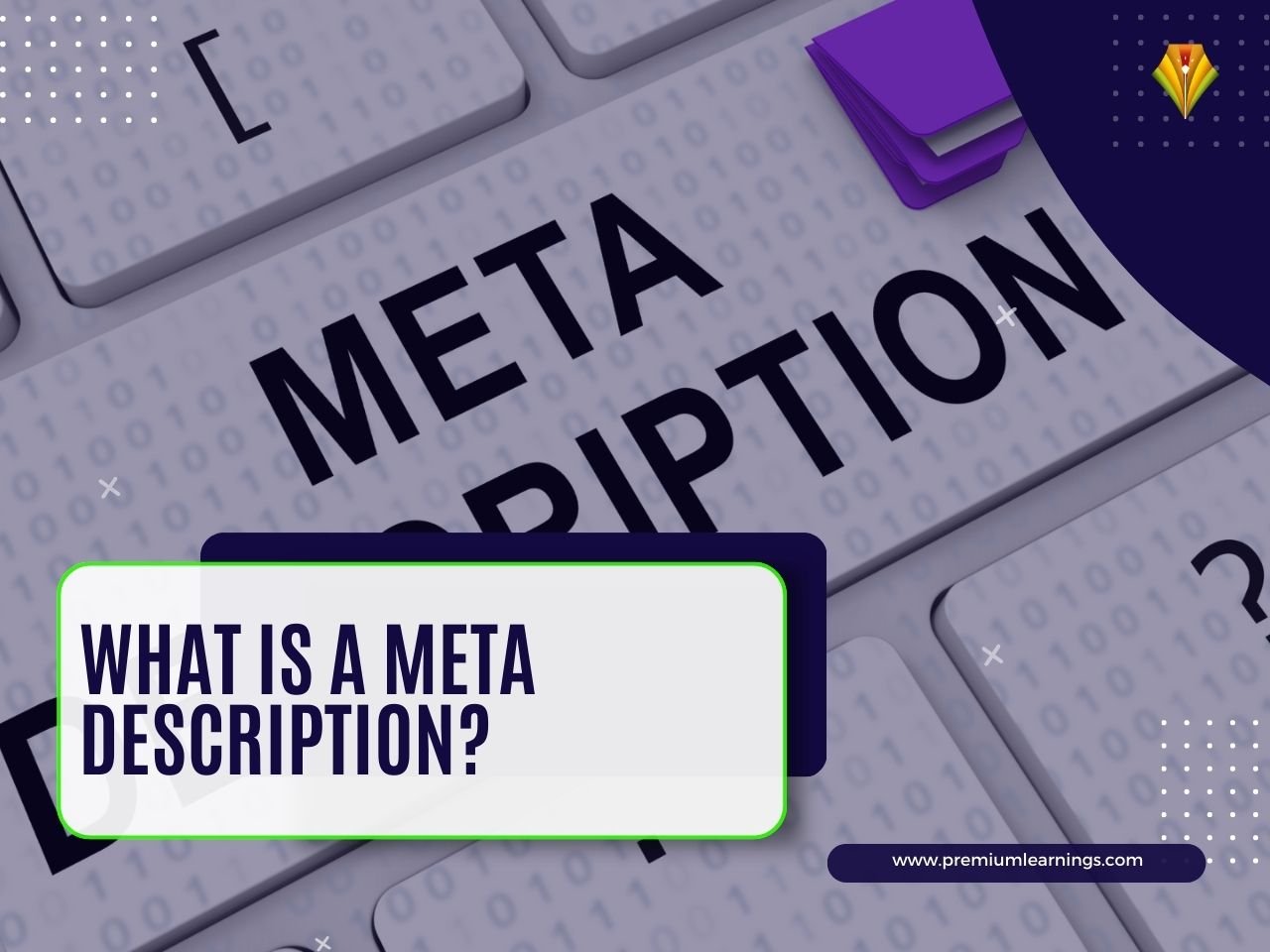What is a meta description?
An HTML property known as a meta description offers a succinct overview of a webpage’s content. In search engine results pages (SERPs), it is displayed beneath the title tag and provides users with a sneak peek of what they will see if they click through.
A brief summary of the website’s content and a call to action encouraging viewers to go through to the page are often included in the meta description. It needs to be written in a way that is easy to understand, interesting to read, and pertinent to the user’s search query.
Meta description examples
HTML code example
<meta name=”keywords” content=”digital marketing course, premium learning systems, interview preparation, career accelerator program”>
SERP example
Just below the page’s navigational route and clickable title tag, the meta description can be found as part of the SERP snippet.
Optimal meta description length
The ideal meta description should be between 155 and 160 characters long, including spaces. The length of the meta description that Google normally shows in search results can range from 155 to 160 characters, depending on the device and screen size being utilised.
Your meta description should be brief and straight to the point while still summarising the page’s content in a precise and understandable way. In order to increase click-through rates and website traffic, a strong meta description is essential.
Why are meta description important for SEO?
Do meta descriptions affect search rankings?
Both yes and no. Google stated in September 2009 that neither meta descriptions nor meta keywords are considered when determining search engine rankings.
However, a page’s click-through rate (CTR) in Google SERPs may be impacted by the meta description, which may favourably affect a page’s potential to rank. The searcher’s chance to assess whether the material is likely to be relevant to their query and include the information they’re looking for is provided by these brief paragraphs, which are the webmaster’s chance to “advertise” content to searchers.
It’s crucial to put some thought into writing your meta descriptions because they can have a major impact on user behaviour and indirectly affect search rankings.
How do I write a good meta description?
Include compelling ad copy in your description
Advertising content is used in the meta description tag. It attracts visitors to a website from the SERP and is a very noticeable and significant component of search marketing. In order to encourage users to go through to the page, a page’s meta description should cleverly use the target keywords for that page in a natural, spam-free manner. In the description display, Google and other search engines frequently bold keywords from the user’s search, catching the searcher’s attention. Try to as closely as you can match your descriptions to useful search terms without over-optimizing them.
Avoid duplicating meta descriptions
Search engines may become confused by duplicate meta descriptions, which could lead them to display a different meta description or, in certain situations, no meta description at all. Additionally, it could be more challenging for consumers to understand what information is contained on each page.
Avoid double quotation marks in Meta descriptions
Google interprets double quotation marks (“…”) in meta description HTML markup as a signal to truncate the description after that point and will consequently remove the remaining text from the SERP snippet. Your best bet is to eliminate any non-alphanumeric characters from meta descriptions to avoid this from happening. If your meta description needs quotation marks, you can avoid truncation by using the HTML entity rather than double quotes.
Why won’t Google use my meta description?
Search engines frequently disregard the meta descriptions of pages, showing text in the SERP snippet that differs from what is expressed in the HTML of the page. It can be difficult to predict when this will happen, but it frequently does when Google decides that the current meta description does not sufficiently address a user’s inquiry and instead chooses a passage of text from the same page that it considers to be a more accurate or compelling response.
This can be irritating, especially if you’ve taken the time to painstakingly construct distinct descriptions for each page, but in some circumstances, you can escape the annoyance by completely leaving the search engine in charge of the website’s description. Conventional wisdom would suggest that writing a strong meta description is always preferable to letting Google scan the page and show their own, but this isn’t always the case. As you choose whether to include a meta description, consider how many important search terms the page is aiming to rank for.
We advise writing your own meta description if the website targets one to three often searched terms or phrases in order to draw readers who utilize such terms in their search searches. It would be best to let the search engines fill out a meta description on their own if the page targets long-tail traffic (three or more keyword phrases). The explanation is straightforward: When search engines compile a meta description, they always present the user’s search terms as precisely as possible. Depending on the question, a webmaster who adds a meta description to a page’s code may actually reduce the relevancy that search engines naturally interpret.
Keep Learning :
To enhance your knowledge on Meta Description and how to write effective meta description , consider attending our Digital Marketing and Growth Hacking session. Register for the webinar now by clicking on the link below.
https://premiumlearnings.com/contact/
You can also download premium learning’s app from the link below
https://play.google.com/store/apps/details?id=com.premiumlearnings.learn&hl=en


